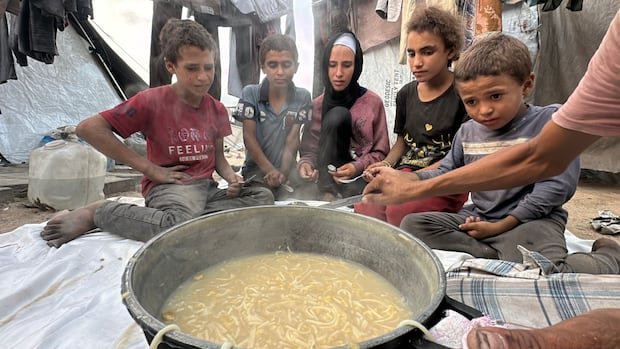In Gaza, one father expresses his deepest wish to witness his son holding a piece of bread due to the severe food scarcity. Mohammad Abu Amsha, residing with his wife and five children near Gaza City, narrates the relentless pursuit of this dream amidst the escalating struggle for survival during the ongoing conflict.
Describing their situation as a catastrophe, Mohammad, aged 39, highlights the extreme hardships they face in securing even a single meal for his family. The Israeli-imposed blockade and nearly two years of warfare have made the task of finding food a perilous and exhaustive endeavor from dawn till dusk.
To begin the quest for sustenance, the family initiates by collecting discarded pieces of fabric to sell, as these materials serve as efficient fire starters in a region plagued by fuel shortages. On a typical day, Mohammad’s children, Rahaf, Ahmed, and Fawzi, aged 13, 11, and 10 respectively, venture out to scavenge for these sought-after scraps, a task that often leaves Mohammad anxiously awaiting their safe return.
Despite the dangers lurking outside, the children eventually come back carrying sacks filled with various cloth remnants, including rugs, nylon, and garments. Amidst their scavenging journey, hunger persists, with young Ahmed admitting, “I was hungry while I was walking.”
The collected scraps are then sold by Mohammad to secure funds for purchasing food. Some days end in disappointment after hours of effort, but on fortunate occasions, like today, they manage to obtain 20 shekels, just enough to afford pasta and lentils, while bread or flour remain out of reach due to financial constraints.
For the Abu Amsha family and countless others in Gaza, this routine of struggling for sustenance has become a daily battle, exacerbated by the recent heightened famine alert issued by the Integrated Food Security Phase Classification (IPC). The report paints a grim picture, revealing a surge in child malnutrition cases and hunger-related deaths, urging immediate large-scale intervention to avert further tragedy.
As the family gathers around a modest meal of lentils and pasta cooked over a small fire, they hold on to hope amidst their dire circumstances. Enas, the mother, reassures her children, promising a better future and a meal with bread, despite the current reality of meager provisions.
In the face of uncertainty, the family shares a simple meal today, knowing that tomorrow’s sustenance is far from guaranteed. As seven-year-old Husam expresses his desire for bread, Enas strives to maintain optimism, instilling patience and perseverance in her children during these trying times.

